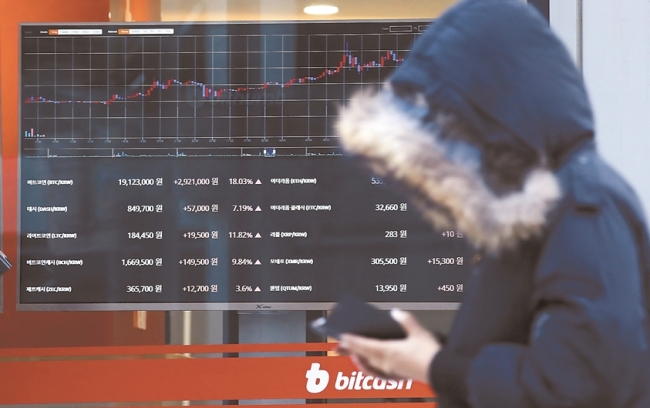South Korea was not an exception from a bitcoin price spike Monday, as the US began trading a derivative related to the de facto key cryptocurrency on the Chicago Board Options Exchange on Sunday.
 |
A local cryptocurrency exchange displays a price chart of bitcoin. (Yonhap) |
As of 1 p.m. Monday, bitcoin in South Korea traded at 19.5 million won ($17,900), up 35.8 percent compared to a day prior, according to data from local coin tracker Coinass.
The coin price remained about 10 percent higher than the world average, the data also showed.
The surge does not necessarily mean a boon to investors or markets, experts noted, as the price is highly volatile due to speculations.
“Bitcoin in Korea is now transformed into a means of speculative investment,” Hong Ki-hoon, a business administration professor at Hongik University and blockchain expert, told The Korea Herald.
Bitcoin, trading at lower than 1 million won in January in Korea, hit an intraday-high at 24.8 million won Friday. But it had since plunged by about 30 percent until Sunday at midnight, partly on a series of news reports about the government’s anticipated move to outlaw cryptocurrency-related business entities the previous week.
Also, a bitcoin-involving scam allegations Sunday added to the price drop before Monday.
On Korea’s online communities Sunday, posts were circulating that plans to launch bitcoin platinum, a new blockchain built following a bitcoin hard fork -- a split path of a blockchain and create a new coin -- was a scam by a high school student in Korea, who claimed he “took margins” from short-selling bitcoins following the plunge.
On Monday morning, bitcoin platinum‘s official account denied the allegations, saying the snaps were fabricated.
Korea is home to three major cryptocurrency exchanges -- Bithumb, Coinone and Korbit -- that combined account for nearly 25 percent of the world’s bitcoin transaction volume, as of Monday at 1 p.m. But the nation‘s financial watchdog has effectively banned trading bitcoin futures, calling it a non-financial instrument.
The government is reportedly expected to unveil plans to label cryptocurrency exchanges illegal fundraisers and shut them down as early as this week and regulate them “as harsh as pornography suppliers,” in a move to curb speculative coin purchases here.
In Hoh, an informatics professor at Korea University and head of the Korea Society of Blockchain, pointed to the information asymmetry rampant among Koreans, which leads to market ineffectiveness and bandwagon effects.
“Koreans, especially in the era of low key rates, have suffered a lack of high-risk, high-return choices to build up assets, coupled with regulation on the real estate market,” he told The Korea Herald.
“Also, let‘s say someone earned profits by investing in bitcoins, then a neighbor would feel left behind from the trend.”
By Son Ji-hyoung
(
consnow@heraldcorp.com)







![[Today’s K-pop] Blackpink’s Jennie, Lisa invited to Coachella as solo acts](http://res.heraldm.com/phpwas/restmb_idxmake.php?idx=644&simg=/content/image/2024/11/21/20241121050099_0.jpg)
